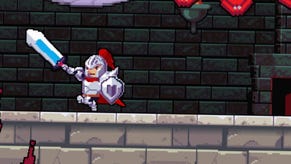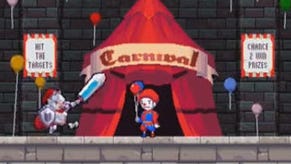Rogue Legacy PlayStation Vita Review: Rogue Rage
The popular metroguevania hack-em-up looks great on Vita, but its underlying flaws still peek through.
This article first appeared on USgamer, a partner publication of VG247. Some content, such as this article, has been migrated to VG247 for posterity after USgamer's closure - but it has not been edited or further vetted by the VG247 team.
I feel like I should enjoy Rogue Legacy a lot more than I do.
The game checks all the right boxes for me: It combines non-linear Castlevania-style platforming with procedurally generated stage layouts. It makes use of a visual style that makes it look like some TurboGrafx-16 game that time forgot. The music rocks, it has RPG-like progression mechanics, and best of all it now runs on PlayStation Vita, where it looks phenomenal.
And yet, something about Rogue Legacy just doesn't quite gel for me. The concept certain seems sound. It's a close relative of Spelunky, a game that could best be described as "delightful." On paper, in fact, Rogue Legacy reads like the swords-and-sorcery version of Spelunky. You control a fragile hero who loses every shred of hard-earned progress upon death, leaving the game's crusade to be taken up by that warrior's descendants. And, as in Spelunky, certain factors external to the protagonist carry on beyond death: The bosses you've defeated, the levels you've unlocked for your family manor, the equipment you've purchased.
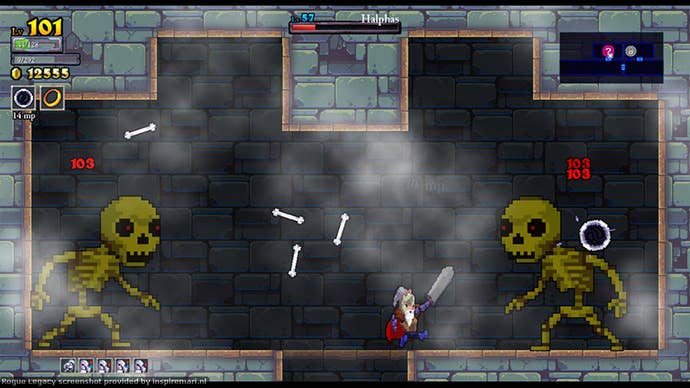
In theory, you can blunder through the game haplessly over and over again until you win through sheer blunt force from all the level-ups you've purchased. In practice, it's not so easy; you build skills by unlocking them with the cash you earn from each foray into the ever-changing castle, and you can't accumulate cash from generation to generation (at least not without making a hefty investment first). You can lock down a castle's design in order to keep the layout stable from one attempt to the next, but in doing so you forfeit 40% of your earnings — and on top of that, all the chests you've opened remain plundered in future generations.
It's a pretty smart approach, honestly. Rogue Legacy forces you to make tradeoffs at nearly every turn. Do you work on exploring a fixed castle layout in exchange for the currency you need to advance your persistent skills and equipment? Or do you allow the castle to warp and change, forcing you to start anew at mapping it out each time you die and hoping for a lucky layout? Do you go after the high-risk "fairy chests"? Do you equip the rune that allows you to double-jump, or do you reduce your mobility in favor of a cash multiplier?
Yet the sheer mutability of the game also serves as the source of its biggest frustration: Everything in Rogue Legacy changes whenever you die, including your protagonist. You can carry over equipment and stat boosts, and you can opt to lock down the layout of the castle, but each time you die you're forced to choose your next avatar from a random lottery of three characters with wildly different attributes. So far as I can tell (after assuming the mantle of millennia worth of dead heroes), the game will never generate a character exactly like the one who just died, especially once you open up advanced classes like Lich and Dragon and expand the pool of options. Each new character typically offers a randomly selected class, a random assortment of quirks (some defects, others perks, depending on your needs and play style), and a random choice of secondary weapon.
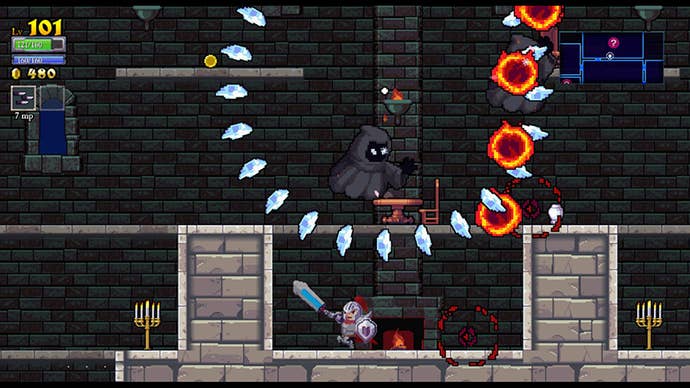
No two heroes are alike, which sounds like a cool benefit and definitely stands as one of Rogue Legacy's more unique traits. In practice, though, I find it undermines the fundamental consistency of the game. I suspect the idea behind hero randomization was to front-load the potential for the good or bad set of circumstances that affect players in standard roguelikes; since Rogue Legacy is meant to be played in a matter of minutes rather than over the course of weeks, and equipment is purchased permanently as you go along, building the whims of fate into the fundamental character build makes a certain amount of sense. But it means your skills and sometimes even your control set up changes from session to session, and there's nothing more frustrating than lucking into a character whose traits fit your play style perfectly only to die and find yourself forced go a dozen generations of ill-fitting choices before having the opportunity to play as a similar character. It's a brave design choice, but brave doesn't always mean successful.
Even then, I don't think I'd mind these constant upheavals if the castle layouts themselves weren't so wildly inconsistent. The game world endlessly rearranges itself into various random configurations of different room layouts that, to some degree, have been predefined. But not all of these rooms are particularly well designed, and there's no sense of progression — you can end up with a castle front-loaded with insanely nasty challenge rooms early in the game, with the interior sections sometimes consisting of multiple screens of low to zero threat. Sometimes you'll even enter a room and immediately be struck by an enemy or trap that spawns right at the door, slamming you with unavoidable damage in a game where every single hit represents a massive setback. The reality is that many of Rogue Legacy's rooms don't abide by the same sense of fairness and consideration as the classic games that inspired it; if some of these layouts had showed up in a legitimate Castlevania game, Konami would have found its collective self ridden out on a rail.
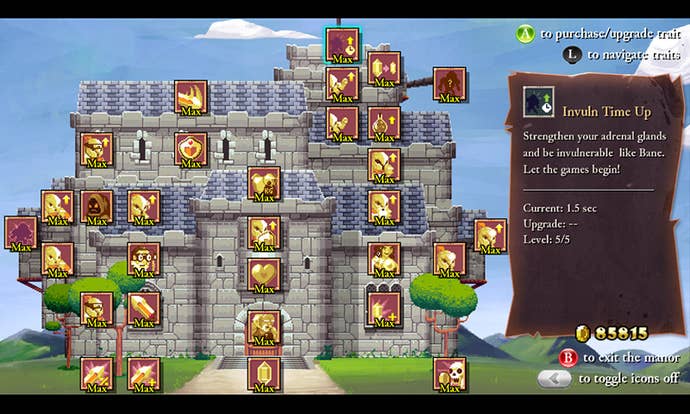
Taken individually, all the different factors that comprise Rogue Legacy's design would be ingredients for a brilliant game. Piled together into a single work, they don't work quite as smoothly as I'd like. Again, the shadow of Spelunky looms large over this adventure; Spelunky works because of the remarkable restraint its design demonstrates. At heart, it's a methodical, slow-paced game with a fairly limited set of rules — and yet it puts those elements to use with marvelous skill, resulting in a game that nevertheless manages to be tense, pulse-pounding, and wildly unpredictable in its outcomes.
Rogue Legacy takes more of a kitchen-sink approach, with the emphasis weighing in on experimentation and breadth of content than on refinement. You can see it in everything from the unpolished stage layouts to the way the controls feel ever-so-slightly off. And that's not necessarily terrible; at their GDC panel this spring, Rogue Legacy's creators openly stated that they took precisely that approach by choice as a matter of practicality. They're a small studio with limited time and money. Cellar Door Games set out to create a messy, unpredictable creation, and that's precisely what they ended up with.
And despite my frustrations with Rogue Legacy, I actually like it quite a bit. Again, I feel like I should like it more than I do, but nevertheless it's a lot of fun, and maddeningly addictive. The entire time I've been writing this review, my mind has been drifting back to the game and contemplating strategies for my next foray into the castle. Ultimately, though, Rogue Legacy lacks the essential hallmark of a truly great roguelike: When I die, I rarely feel like it was my fault rather than due to a quirk of an unlucky roll or a bad room arrangement or simply the slightly loose controls.
VisualsRogue Legacy definitely falls into that "trying to look 8-bit, but not particularly concerned with accuracy" rubric. But it works.
SoundAppropriately old-school music and effects, and not much more.
InterfaceSimple and clean, though the controls lack the crisp precision of the game's inspirations.
Lasting AppealOnce it sinks its hooks into you, you'll be caught for a very long time — it's a huge, difficult game, and its New Game + is even deadlier.
ConclusionFun but flawed, Rogue Legacy falls somewhat short of its lofty aspirations. But you can't fault the developers for aiming high. It's a worthy attempt at marrying a lot of ideas together, and I'm fully confident that the developers will pull it off with their next venture. In the meantime, there's plenty of fun to be had here — and it makes a great fit for the Vita platform, too.

